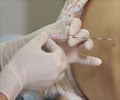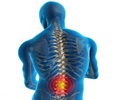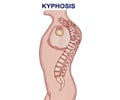A new approach to prevent paralysis following a spinal cord injury has been suggested by scientists from Weill Cornell Medical College.
A new approach to prevent paralysis following a spinal cord injury has been suggested by scientists from Weill Cornell Medical College.
They believe that permanent nerve damage may be avoided by raising levels of a compound that converts to nicotinamide adenine dinucleotide (NAD+) - the active form of vitamin B3.The compound would potentially be administered immediately following spinal cord injury.
"Boosting NAD+ after injury may prevent permanent nerve death," said Dr. Samie Jaffrey, associate professor of pharmacology at Weill Cornell Medical College.
"Our study is aimed at synthesizing a molecule that, when given soon after injury, may augment the body's production of NAD+ and rescue these cells before they are stressed beyond recovery," Jaffrey added.
The compound, called nicotinamide riboside (NR) - a natural NAD+ precursor found in foods like milk - as well as other NR derivatives have already been proven to protect against cell death and axonal degeneration in cultured cells and in models of spinal cord injury.
NAD+ is known to play a key role in human cells by activating proteins called sirtuins that help the cells survive under stress. Sirtuins, which can be activated by compounds like resveratrol (found in large concentrations in the skin of grapes used to make red wine) have been shown to possess anti-aging and healing properties.
Advertisement
"We hope to show that a natural compound that can be produced cheaply and efficiently could be the key to preventing permanent injury," said Dr. Anthony Sauve, associate professor of pharmacology at Weill Cornell Medical College.
Advertisement
Source-ANI
RAS










